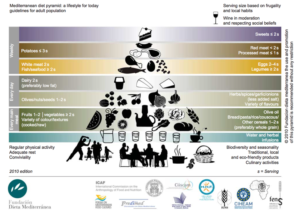The Benefits of the Mediterranean Diet
Post By Miah Williamsen, Nourish Northwest Nutrition Intern
Olivia’s recent trip to Sicily (and all of the amazing photos she shared on Instagram of the meals that she ate while she was there) got me thinking about the Mediterranean diet. Most people have heard of the Mediterranean diet and may even know that it emphasizes using large quantities of olive oil and encourages the drinking of red wine. However, what most people do not likely know is that the Mediterranean diet is also one of the most health-promoting dietary patterns in the world, and thousands of research studies have demonstrated its numerous health benefits.
Below is a detailed exploration of Mediterranean diet: where it originated, what it entails, what foods to eat, and what health condition it benefits. Read on and learn how to eat, live, and thrive like a Sicilian.
What is the Mediterranean diet?
The Mediterranean diet is based on the traditional diet and lifestyle habits of peoples living around the Mediterranean Sea (primarily Southern Italy, Greece, and Crete). In the 1960’s for his Seven Countries Study, researcher Ancel Keys observed that people living in this region had much lower incidences of chronic diseases related to diet and lifestyle, such as diabetes, cardiovascular disease, and cancer.1,2,3 He concluded that a diet rich in whole, plant-based foods, consumed in moderation and in the company of others, was optimal for health and wellbeing. Subsequent research on the effects of the Mediterranean diet and lifestyle on disease prevention and health promotion have largely confirmed this hypothesis. The therapeutic potential of the Mediterranean diet, which is characterized by the high consumption of fruits, vegetables, cereal grains, legumes, nuts, seeds, and olive oil, moderate yet regular consumption of red wine, fish, poultry, eggs, and dairy, and minimal consumption of meat, sweets, and processed foods, has been demonstrated time and again.1,2,4 Moreover, in 2010, UNESCO officially defined the Mediterranean diet as a cultural heritage of humanity, due to its strong emphasis on aspects unrelated to food, such as seasonality, biodiversity, conviviality, social support, and sustainability, that promote health, quality of life, and longevity.4
What to Eat (and Drink) on the Mediterranean Diet1,2:
- An abundance of plant foods that are locally grown and in season
- 2+ servings of colorful vegetables with each meal; at least one serving is raw
- 1-2 servings of fresh fruit per meal, typically consumed as the after-meal dessert
- 1-2 servings of cereal grains, including pastas, bread, rice, and couscous per meal; choose whole grains at least half the time
- 1-2 servings daily of nuts, seeds, and olives
- Legumes 2+ times per week, combined with whole grains to make a complete protein
- Olive oil should be consumed daily and serve as the main source of added fat in the diet. Olive oil is rich in monounsaturated fatty acids (namely oleic acid) and consumption is associated with decreased risk of dyslipidemia, cardiovascular disease, and some cancers.1
- Red wine, consumed in moderation and with meals, 1-2 glasses per day. Red wine contains a polyphenol called resveratrol that acts as a potent anti-inflammatory agent in the body and confers numerous cardioprotective effects.
- Yogurt and cheese (often low-fat is emphasized), up to 2 servings per day.
- Eggs, 2-4 servings per week
- Fresh fish 2+ servings per week; emphasis on fatty fish high in omega-3 fatty acids, such as salmon, sardines, and mackerel.
- Poultry, 2 servings per week.
- Limit red meat consumption to less than 2 servings per week and emphasize lean cuts; limit processed meats (like bacon, bologna) to less than once per week.
- Occasional (i.e. less than twice per week) consumption of energy-dense and nutrient-poor foods, like pastries, candy, ice cream, chips, and sodas.
One can further enhance the health promoting effects of the Mediterranean diet by:
- Choosing organic produce, wild caught fish, and grass-fed meat whenever possible.
- Using extra virgin olive oil, as it has a higher polyphenol content, and, thus greater antioxidant and anti-inflammatory potential.5
- Increasing consumption of nuts and fatty fish5 to increase intake of anti-inflammatory omega-3 fatty acids.
- Opting for whole grains (brown rice, sorghum, wheat berries) over refined, cereal grains (bread, pasta, couscous) more often, as they have a less dramatic effect on blood glucose levels and are correlated with lower disease risk.5
- Reducing sodium intake5; instead, use herbs and spices to add flavor and increase the phytonutrient and antioxidant potential of meals.1
- Consuming red wine daily, in moderation. The combined effect of the alcohol and polyphenols in red wine has shown to be cardioprotective.5
The Mediterranean Lifestyle
The Mediterranean diet is more than just a dietary pattern, it is a way of living. The Mediterranean diet emphasizes a food and behavioral synergy that accounts for not only what one eats, but how one prepares, interacts with, and consumes food; one’s food choices, the eating environment, and the company one’s eats with all play a role as well.2 Moreover, the myriad health benefits associated with the diet are thought to be due to the combination of the fresh, local, and seasonal foods that are typically consumed and the lifestyle that is embodied by the majority of the inhabitants of the region. To live and thrive like a local:
- Move your body every day: walk to work or the grocery store, garden, run around with your kids, or take a stroll through the neighborhood.
- Eat communally: prepare and eat your meals with others; enjoy the company, the conversation, and the ambiance; don’t speed through your meal, but savor it.
- Socialize: be a part of a community, get to know your neighbors, connect with people, support one another.
- Prioritize rest: take a post-lunch siesta (mid-day nap), carve out time for self-care and relaxation, get enough sleep.
Why Should I Follow the Mediterranean Diet?
The Mediterranean diet is the most researched dietary pattern in the world, and thousands of studies have demonstrated its numerous health benefits.
These include2–4:
- Reduced risk of:
- All-cause mortality
- Cardiovascular diseases
- Type 2 diabetes
- Metabolic syndrome
- Dementia, mild cognitive impairment, and Alzheimer’s Disease
- Mortality from some cancers
- Promotes healthy aging and longevity
These benefits have been shown in both Mediterranean and non-Mediterranean populations2, suggesting that adopting the Mediterranean diet and lifestyle is health-promoting and disease preventing, regardless of whether one lives in the Mediterranean or not, or is of Mediterranean decent or not. The anti-inflammatory and antioxidant properties of the diet (high in polyphenolic-rich plant foods, healthy monounsaturated and polyunsaturated omega-3 fatty acids, and fiber) are thought to underlie the majority of its therapeutic benefits, as they help to decrease inflammation, reduce oxidative stress, and modulate hormone levels and metabolism.2,5
Because the Mediterranean diet emphasizes seasonal, whole, plant-based foods, ample herbs, spices, and olive oil, moderate consumption of red wine, and social eating, the meals taste delicious and the diet is easy and enjoyable to follow. It fact, I wouldn’t even call it a diet at all. Rather, it is a way of eating and living that promotes health, community, and happiness, and allows for the occasional gelato, too.
References:
- Bach-Faig A, Berry EM, Lairon D, et al. Mediterranean diet pyramid today. Science and cultural updates. Public Health Nutr. 2011;14(12A):2274-2284. doi:10.1017/S1368980011002515.
- Yannakoulia M, Kontogianni M, Scarmeas N. Cognitive health and Mediterranean diet: just diet or lifestyle pattern? Ageing Res Rev. 2015;20:74-78. doi:10.1016/j.arr.2014.10.003.
- Gerber M, Hoffman R. The Mediterranean diet: health, science and society. Br J Nutr. 2015;113 Suppl 2:S4-10. doi:10.1017/S0007114514003912.
- Chatzianagnostou K, Del Turco S, Pingitore A, Sabatino L, Vassalle C. The Mediterranean Lifestyle as a Non-Pharmacological and Natural Antioxidant for Healthy Aging. Antioxid Basel Switz. 2015;4(4):719-736. doi:10.3390/antiox4040719.
- Estruch R, Salas-Salvadó J. Towards an even healthier Mediterranean diet. Nutr Metab Cardiovasc Dis NMCD. 2013;23(12):1163-1166. doi:10.1016/j.numecd.2013.09.003.







